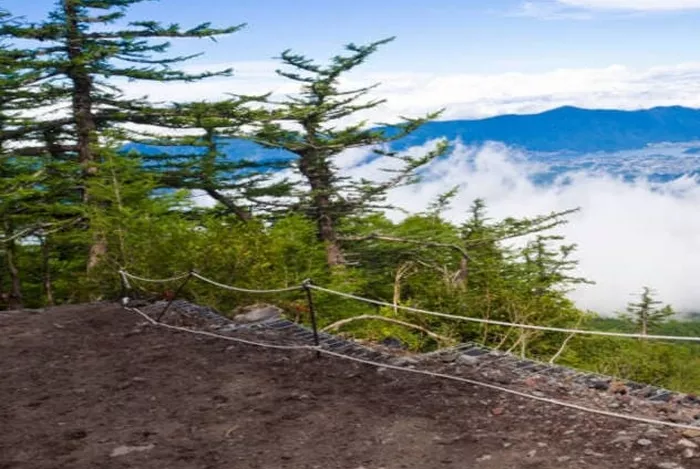If you’re dreaming of a big hiking trip in 2025, prepare to pay more to explore the world’s most famous trails. Japan is the latest country to raise hiking access fees, joining Peru, India, Switzerland, the U.S., Canada, Portugal, and others in a growing global effort to make outdoor tourism more sustainable. Beginning in July 2025, those climbing Mount Fuji’s Yoshida Trail—the most frequented route to the summit—will need to pay a mandatory fee of 4,000 yen (approximately $28 USD), which is twice the current amount.
This fee increase isn’t just about money. It’s part of a bigger plan to address serious problems like overcrowding, trail damage, safety concerns, and waste. Countries such as Peru (Inca Trail), India (Valley of Flowers), and Switzerland (glacier treks) are using similar fee systems to manage visitor numbers, protect the environment, and fund essential services like rescues and maintenance.
As this movement spreads, hikers will need to plan ahead—both financially and logistically. Booking systems, permits, and regulations are becoming standard. The good news? These changes bring cleaner trails, safer conditions, and a better overall hiking experience.
Trails from Mount Fuji to Peru’s Inca Trail are seeing record numbers of visitors. While this is good for tourism, it’s bad news for the fragile ecosystems along these routes. In response, many governments are charging hikers fees that help:
- Protect natural habitats and reduce litter
- Fund trail maintenance and emergency services
- Control crowd sizes with daily permit limits
- Encourage responsible travel and behavior
Japan’s upcoming Mount Fuji fee is a perfect example. The ¥4,000 cost will be used to manage waste, fund rescues, improve infrastructure, and protect the environment. The new system will also limit the number of hikers each day through a reservation system, helping to ease congestion and improve safety.
Other countries in Europe are following similar models. On the Portuguese island of Madeira, a €3 waste management fee was introduced in 2024 on just seven trails. By early 2025, the fee applied to all 38 recommended routes. In only three months, Madeira earned over €350,000 from the program.
This success proves that even small fees, when well-managed, can make a big difference in preserving nature. Importantly, Madeira exempts locals from the fee, ensuring tourism pays the bill for trail upkeep without burdening residents.
Across six continents, more nations are embracing hiking fees to balance tourism with conservation goals. Here’s how some are adapting:
United States: Trails like Half Dome (Yosemite), Angels Landing (Zion), and The Wave (Arizona) require permits to control crowds and fund maintenance.
Canada: Parks such as Banff and Jasper now require both day-use and backcountry passes for hikers, protecting habitats and regulating visitor flow.
India: Eco-fees are required for trails like Roopkund and in parks like Hemis National Park, helping preserve these remote regions.
Peru: Strict quotas and high permit costs on the Inca Trail help protect ancient ruins and the surrounding environment.
Switzerland: While many trails remain free, high-altitude glacier routes now have access fees to support conservation and rescue services.
The global trend includes several other notable countries:
Nepal: The Mount Everest climbing permit now costs $15,000 in peak season. Treks like the Annapurna Circuit also carry conservation charges.
Bhutan: All tourists must pay a $100 daily Sustainable Development Fee, with additional fees for certain treks.
South Africa: Hiking in protected areas like the Drakensberg requires entry fees that fund biodiversity conservation.
Tanzania: Climbing Mount Kilimanjaro involves multiple fees covering park access, guides, camp setups, and emergency services.
Rwanda: Permits for gorilla trekking in Volcanoes National Park cost $1,500, funding conservation and community projects.
New Zealand: Trails like the Milford and Routeburn tracks require bookings and passes, especially during peak seasons.
Chile: Torres del Paine enforces entry and camping fees, and premium permits are required for advanced treks like the O Circuit.
What Hikers Should Expect in 2025 and Beyond
Planning a hike? Be ready for a few changes:
Book early: Reservation systems and lotteries are now common for top trails, with spots filling up months ahead.
Plan your budget: Fees for entry, camping, permits, and conservation could add hundreds of dollars to your travel costs.
Know the rules: Stick to trails, pack out all trash, and respect wildlife guidelines to avoid penalties.
Travel responsibly: Use eco-friendly guides and services that follow sustainable tourism practices.
These new fees aren’t just about regulation.
They reflect a deeper shift in how we think about travel. As the world recovers from the pandemic and tourist numbers rise again, it’s becoming clear that enjoying nature comes with shared responsibility. These costs help preserve the places we love for future generations.
Most hikers now see these fees not as burdens, but as investments in the health of our planet. Cleaner paths, safer hikes, and richer experiences are well worth the price.
By introducing a climbing fee on Mount Fuji, Japan joins a larger global movement to balance tourism with environmental protection. This isn’t just a trend—it’s the future of outdoor travel. As more countries adopt similar measures, hiking is evolving from a free-for-all into a more mindful and sustainable activity.
Whether you’re climbing Japan’s tallest peak, exploring the Swiss Alps, or hiking through India’s national parks, 2025 will be the year to plan wisely, walk lightly, and travel with purpose.
Related Topics
- Injured Hiker Rescued After Overnight Ordeal on Bluff Knoll
- New Guidebook Charts 132-Mile Thru-Hike from Santa Fe to Taos: A Wilderness Journey Decades in the Making
- Hidden Gems and Hills: A Scenic Trek from Tennessee Valley to Muir Beach

